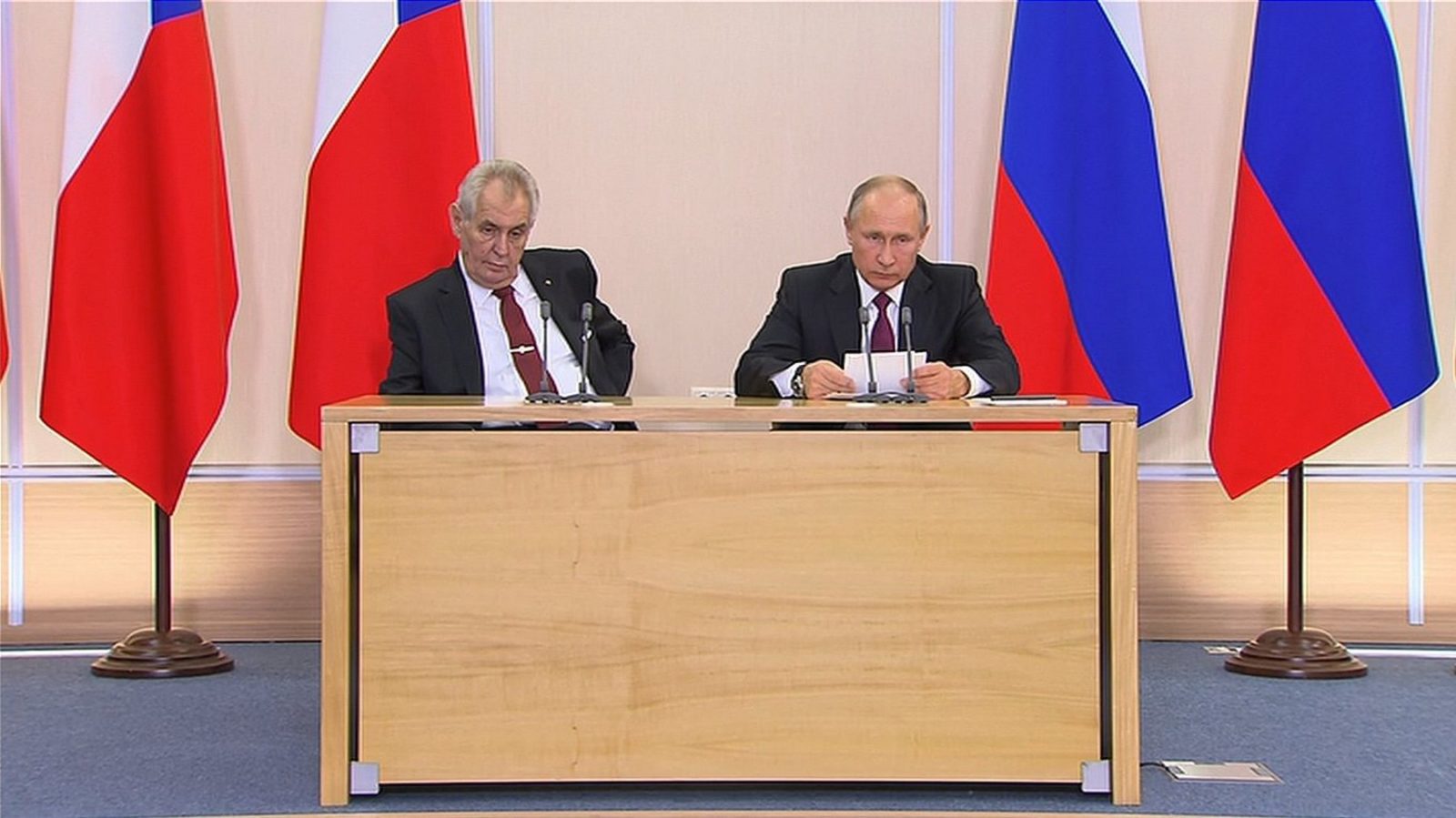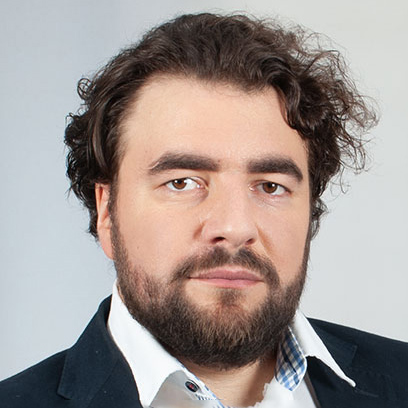For not the first time in the country’s history, the Czech Republic finds itself squeezed between the interests of Moscow and Berlin. But this isn’t a question of what independent foreign policy choice the country takes; the size of the country, its economy, its level of international influence, and its membership of the EU and NATO all preclude the Czech Republic from making a fully independent choice. The Czech ruling class is limited in its capabilities, while Czech society takes an almost equally dim view of all prominent foreign politicians (for example, Angela Merkel, Donald Trump, and Vladimir Putin) whose countries are perceived to have a significant influence on the Czech Republic. And the higher this perceived influence, the worse the attitude.
The Czechs are aware that their country’s situation depends more on the decisions of external players than those of the Czech ruling class itself. That awareness has nourished a particular desire among the Czechs for greater independence and influence. The country’s rapidly enriching ruling class is actively investing across Western Europe, where it wants to be treated as an equal. A partner in the east is needed in these circumstances to provide additional bargaining power. However, cooperation with Russia could ultimately prove a poisoned chalice, sapping power from the very constitutional order of the Czech Republic.
Pretending to Pivot
The Czech Republic cannot, and does not, seriously want to do an about-face and pivot to the east. NATO remains the main guarantor of its security. Public trust in the alliance has even grown in comparison with 2016, although it reached a peak in 2014, immediately after Russia’s annexation of Crimea. This reflects the attitude of a significant section of Czech society, which characterises Russia as a potential threat.
Trade between the Czech Republic and Russia in the first nine months of 2018 was more than ten times lower than the trade turnover with Germany, and thirty times less than with the EU as a whole. Thus Russia clearly cannot provide an alternative to trade with Europe.
But when compared with Czech trade with the United States, then Russia comes out a little ahead. That’s understandable; given the comparatively small size of the Russian economy, the Czech Republic counts as a serious trading partner. American companies, however, are less interested in a country whose economy has a smaller turnover than a single US state. It’s very rare for Czech companies to be able to sell their goods in the quantities demanded by the most “consumeristic” country in the world. If there is a single non-EU trading partner the Czech Republic would do well to court, it would be China: the Czech Republic’s trade turnover with the People’s Republic is only four times lower than trade turnover with neighbouring Germany.
Prague and Beijing keep their discussions to purely economic issues. Moscow’s policy, on the other hand, is to expand its zone of political influence, a goal for which it is willing to pay. Yet Czech opponents of sanctions against Russia hardly demand that their country reorient its trade exclusively towards Moscow; they flirt with Russia in order to gently blackmail the EU, threatening to stop a political orientation towards the Kremlin only in exchange for significant political and economic concessions from European partners.
The Czech government, with billionaire Andrej Babiš at its head, is not predisposed to befriend Russia to the detriment of its own interests. When countries across the EU expelled Russian diplomats following the poisoning of Sergei Skripal, the Czechs were among the most active. After all, there are no initiatives aimed at deterring the Kremlin which the Czech Republic would not support in practice. Although, of course, empty words can mean anything.
The Pro-Russian Minority
It is worth paying attention to those figures who make pro-Russian statements in the Czech Republic. Chief among them are President Miloš Zeman, who is openly supported in the Kremlin, people from Zeman’s close entourage, or local political radicals (either communist or nationalist.) This is a distinct group within the Czech establishment whose economic and political interests are tied to Russia.
The Czech press periodically tries to prove that this friendship didn’t emerge due to common interests, but due to the Kremlin’s generous economic assistance. However Miloš Zeman, who despite his poor health managed to be re-elected for a second term, doesn’t spare a thought for the media coverage. Zeman is perhaps the one politician whose political style most closely matches that of Russian foreign policy. That style is called trolling, and the Czech president has mastered it to perfection.
Zeman’s statements that the Novichok nerve agent could have been developed in the Czech Republic, his proposal that the Crimea should be left to the Kremlin once it pays Ukraine compensation, his calls to lift sanctions against Russia, and attempts to interfere with the extradition of Russian hacker Yevgeny Nikulin to the US leave no room for doubt about his pro-Russian orientation. The radical, liberal opposition in the Czech Republic have even started to call the country’s president the “resident” instead.
However, as a parliamentary republic, president Zeman’s influence on Czech policy is not so significant. While a pro-Russian lobbying group can certainly influence the public mood, it cannot in any way turn the country towards the Kremlin and away from the west. But there is still one important consequence for the Czech Republic: namely that the Czech establishment’s interest towards Russia could lead to an erosion of the country’s constitutional order. Methods previously deployed in Russia to put the independent media, opposition political parties, and municipal authorities under the control of the central government could be used here too, helping to degrade the constitutional order and strengthen the influence of individual political actors (such as the president) to the detriment of political institutions. Similar processes are also underway in Poland, Hungary, and to a certain extent in Slovakia. But only in the Czech Republic can an equals sign be placed between those actors weakening the constitutional order and politicians who strategically or circumstantially orient themselves towards the Kremlin.
A Zero-Sum Game
We should not assume that the Kremlin always takes the pro-Russian statements of certain Czech politicians at face value. Moscow understands that the Czech Republic does not play a decisive political role in the EU, so cannot become its Trojan Horse.
Accordingly, there is no financial rationale to searching for levers of control over the Czech economy. As for sanctions, the ability to receive technology from the Czech Republic by legal or semi-legal means is officially the only substantial economic issue which could arise if international sanctions continue to complicate Russia’s access to modern technologies, quickening the pace of the country’s technological isolation. Unofficially, there’s also cooperation between Russian officials and managers of corporations and their Czech counterparts, rather than the Czech authorities per se. Both parties are mutually engaged in corrupt schemes and found criminal organisations which leech of the budgets of their respective countries.
One example is Zeman’s chief of staff Vratislav Mynář, who is believed to be behind several questionable schemes used to finance the president’s pre-electoral campaign, in which several Czech firms with ties to Russia also participated. In 2015 the National Security Council refused to give Mynář the security clearance which would have allowed him access to state secrets. The same problem was faced by Jan Mládek, the Czech Republic’s former Minister of Trade who is married to a Russian citizen and has actively lobbied for economic cooperation with Moscow. Yet another example is Martin Nejedlý, an adviser to the president and ex-manager of the Czech brach of Lukoil, a Russian energy giant.
As a country that publicly defends Russia’s interests, even by only paying lip service, the Czech Republic is very important to Moscow. Thanks to Miloš Zeman, it is now possible within the EU to openly discuss ideas that were previously regarded as completely marginal, such as Russia paying compensation to Ukraine for the annexation of Crimea. It suits the Kremlin to ensure that lifting sanctions against Russia remains a matter of public discussion in the EU, along with the claim that the economies of EU member states are suffering as a result of them. Moscow is ready to exercise its influence towards this goal; an influence which the Czech authorities use to silently blackmail their EU partners.
Strategic Implications
For Russia itself, flirting with the Czech Republic bears no strategic consequences. The scale of political influence of the two countries is simply incomparable; there can be no concerns about Czech influence on the Russians. As far as politics is concerned, the interactions between the Czech and Russian elites is a one-way street. Only the Kremlin influences the Czech politicians in Prague Castle, although both sides benefit from that influence in different ways.
The consequences for the Czech Republic are quite different. Its president plays a special role, by constantly casting doubt on and thereby undermining certain aspects of the country’s constitutional order — a role which arose before Zeman’s ascent to power, and not solely due to Russian influence. However today, the Kremlin’s support, at least on the level of consulting and financial aid, permits the current Czech authorities to quite effectively refashion the country in their own image. In this, even the government of Andrej Babiš has turned out to be an ally of Zeman, and therefore the Kremlin. No wonder that Babiš relies on the ad-hoc support of two pro-Russian forces in parliament, including the Czech Communist Party.
Influenced and supported by Russia, the Czech Republic is currently destroying the independence of public radio and television, and pushing through changes to the electoral system which even extend to introducing direct elections of municipal heads (thus removing them from party influence and putting them under the control of sponsors.) Furthermore, the elimination of the senate is now under discussion, the upper house of the Czech Republic’s parliament which Babiš’s populists and their pro-Russian allies have been unable to put under control.
The constitutional system of the Czech Republic is shaken to its core. Even if the future may see a waning in the significance of Russian influence and new faces at the head of the Czech state, these systemic changes will persist. They will influence both the domestic and foreign policy of the Czech Republic for many years to come.
Most probably, the desire to play on the contradictions between Berlin, Brussels, and Moscow will also continue. After all, the Czech Republic is interested in having some kind of alternative to exclusive cooperation with the EU, and the Czech ruling classes will always be on the lookout for such an alternative. It is hardly their fault if a dangerous partner like Russia proves the best fit for that role.
What does the future hold for relations among Russia, Europe and the United States? This article is part of a series on future scenarios, sponsored by Riddle in cooperation with Johns Hopkins University SAIS and DGAP, supported by the Robert Bosch Stiftung.











